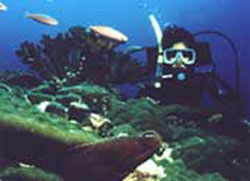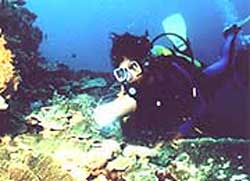| SCUBA Diving Discovering Diving |
|||||||||||||||||||||
Mitali, went for her first orientation dive off the coast of Mauritius, accompanied by friends. Her husband, Prahlad, had been fascinated by his diving holiday the previous year and had convinced her to try it. On his first dive, he had found a copy of the Koran on the ocean floor. Mitali says, "He was very excited, convinced there was a message in it for him, and he described the beauty and wonder of it all, without mentioning how keyed-up and tense he had been. I'm not an adventurous person, and went along to Mauritius with great trepidation. I was fascinated by the colour of the sea - an Asian blue. Our instructor, Hugh Vitry, helped me to overcome my fears. Literally holding my hand, he dived with me." Mitali recalls, "I was convinced I would not be able to handle it, in spite of Prahlad's reassurances that I could do it. I was claustrophobic and ready to chicken out, even with all my gear on. |
Scuba Diving • Diving Experience • Ocean of Joy
Travelogues
Adventure activities | ||||||||||||||||||||
First, I snorkelled around the pier.
 The boat was perched in the middle of the ocean, where the coral was very high, so I felt quite safe wading into thigh-deep water. Very gradually, I went in. My instructor gave me a balloon fish to hold. It's a flat fish, which puffs up as you hold it. As I grew accustomed to my new environment, fascinated, I realised I wasn't holding anyone's hand, I wasn't conscious of my breathing or reassuring myself by looking at the ocean floor - I was just enjoying it, thoroughly, though my emotions were mixed with a little fear." The boat was perched in the middle of the ocean, where the coral was very high, so I felt quite safe wading into thigh-deep water. Very gradually, I went in. My instructor gave me a balloon fish to hold. It's a flat fish, which puffs up as you hold it. As I grew accustomed to my new environment, fascinated, I realised I wasn't holding anyone's hand, I wasn't conscious of my breathing or reassuring myself by looking at the ocean floor - I was just enjoying it, thoroughly, though my emotions were mixed with a little fear."
Speaking of their instructor, Prahlad says, "He had never expected me to return - I was so stressed. He was quite surprised to find me. Mitali adds about their instructor, "He was really brilliant," to which Prahlad's aside is, "All the women were in love with the ugly little man." But they both agree that without Hugh they would not have discovered the joys of scuba diving. Says Prahlad, "Every other holiday is insignificant - diving has spoilt us for any other recreation."
A dive which Hugh reserves for his special students is the Garden of Eden dive. "There was an embankment of the most beautiful light pink and lilac soft coral, which suddenly dipped to give way to an yawning abyss of deep indigo," Mitali says. Reflecting on the whole experience, she adds, "The sea is the ultimate power, which creates in you an enormous sense of respect - diving into the depths of the ocean makes you aware of your total insignificance." About scuba diving as a sport, she says, "It is a buddy sport, which teaches you to be very disciplined, and it can be a very safe sport if you adhere to the rules."
"When I have a woman as my buddy or partner, I know she will be right there, with me," Mitali says. "Men tend to wander off; I have to be much more alert when my buddy is a man." Prahlad agrees. "Women are more dependable underwater, with a stronger sense of discipline and are generally more relaxed." Mitali says, "When you are diving you feel all alone in an alien world. The first time there is a great deal of fear tinged with anticipation. Diving has rid me of all my phobias and taught me to conquer my fears. I am no longer afraid, but I can still feel the adrenalin pumping, along with the eager anticipation of each dive - it is a tremendous high. I love night dives, when you see a totally different kind of marine life. There are the night sea-slugs, lobsters moving slowly with an orange luminosity and fish lying sleeping wrapped in a thin membrane-like cocoon, caught in the flare of the torch-light. Then there's deep black darkness when you switch off the torch."
Photo Credit: Lacadives
|
|||||||||||||||||||||
Editor: Romola Butalia (c) India Travelogue. All rights reserved. |
|||||||||||||||||||||

 Mitali's deepest dive, at 61 metres below sea-level, took place at King Fish Grotto. "Up to about 30 or 35 metres, you can hear the filtered sound of speed-boats," she recalls. "Beyond 40 metres, you enter a world of the deepest silence. There were these huge king fish circling, making silver trails in the deep blue sea. For me, it was really a religious experience, like nothing else I have ever known."
Mitali's deepest dive, at 61 metres below sea-level, took place at King Fish Grotto. "Up to about 30 or 35 metres, you can hear the filtered sound of speed-boats," she recalls. "Beyond 40 metres, you enter a world of the deepest silence. There were these huge king fish circling, making silver trails in the deep blue sea. For me, it was really a religious experience, like nothing else I have ever known."